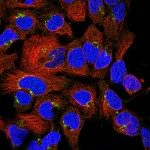Lien vers Pubmed [PMID] – 19424437
PLoS Pathog. 2009 May;5(5):e1000426
Prion diseases are fatal, neurodegenerative disorders in humans and animals and are characterized by the accumulation of an abnormally folded isoform of the cellular prion protein (PrP(C)), denoted PrP(Sc), which represents the major component of infectious scrapie prions. Characterization of the mechanism of conversion of PrP(C) into PrP(Sc) and identification of the intracellular site where it occurs are among the most important questions in prion biology. Despite numerous efforts, both of these questions remain unsolved. We have quantitatively analyzed the distribution of PrP(C) and PrP(Sc) and measured PrP(Sc) levels in different infected neuronal cell lines in which protein trafficking has been selectively impaired. Our data exclude roles for both early and late endosomes and identify the endosomal recycling compartment as the likely site of prion conversion. These findings represent a fundamental step towards understanding the cellular mechanism of prion conversion and will allow the development of new therapeutic approaches for prion diseases.

